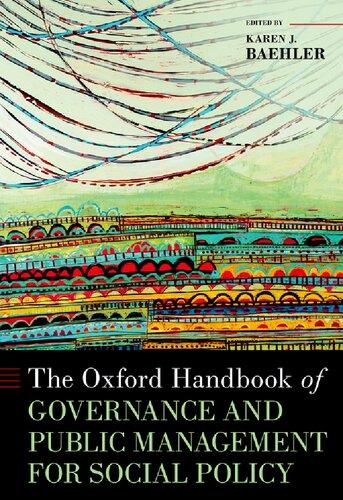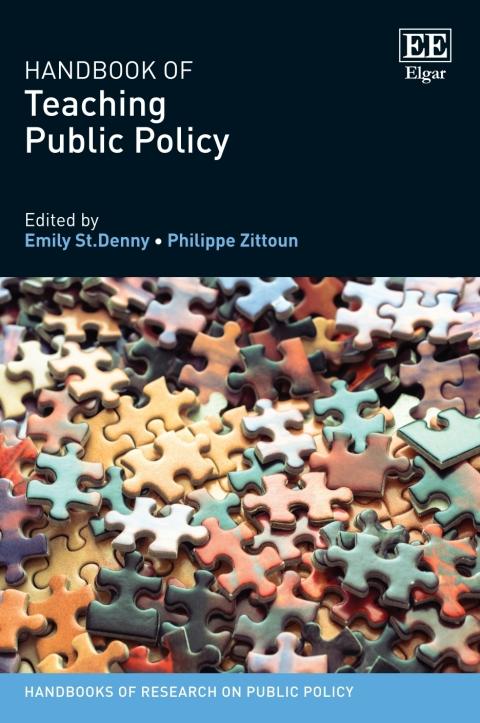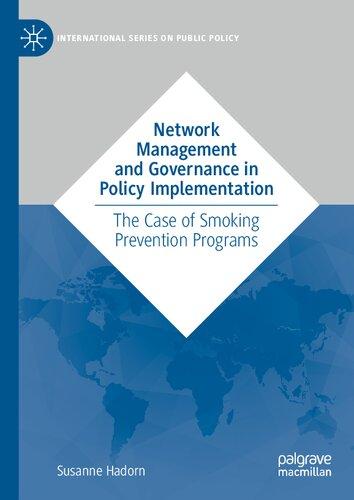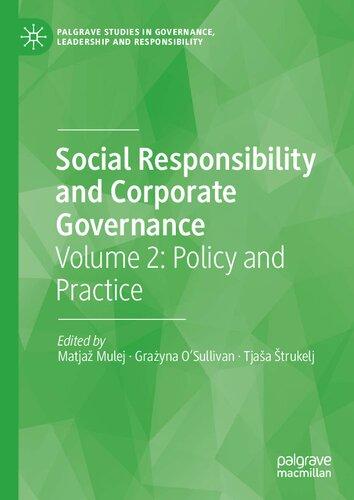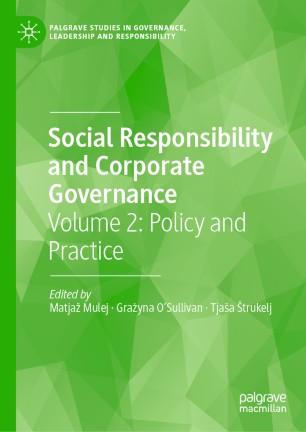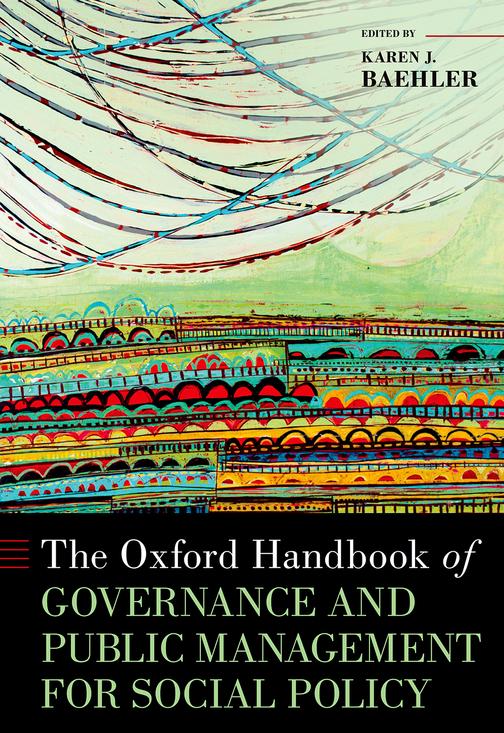CONTENTS
List of Contributors xiii
Introduction
1. Introduction to the Handbook 3
Karen J. Baehler
Section I • AFRICA
2. Section Overview: Governance and Management of Social Policy in Africa 23
Viviene Taylor
Historical Evolution and Social Trends
3. The Policy Challenges of Africa’s Changing Demography and Social Structures 39
Chance Chagunda
4. Diversity and Transformative Policy within South African Higher Learning Institutions 53
Khosi Kubeka
Institutions, Organizations, and Operations
5. Governmental and Non-Governmental Responses to Vulnerable Children in Mozambique and Guinea-Bissau 71
Tomoko Shibuya
6. Youth Participation in African Social Policy and Governance 89
Tessa Dooms and Pearl Pillay
7. Administering Social Protection in Post-Conflict Uganda 102
Julius Okello and Viviene Taylor
Finance
8. Financing and Reframing Universal Social Protection in Africa 117
Brenton Van Vrede
Innovation and Evaluation
9. New Approaches to Youth Justice in South Africa 133
Thulane Gxubane
10. Transforming Social Protection in South Africa 148
Viviene Taylor
11. Evaluation Trends and Innovation in Africa 167
Jean D. Triegaardt
Section II • ASIA
12. Section Overview: Governance and Management of Social Policy in Asia 183
Yijia Jing and T. J. Lah
Historical Evolution and Social Trends
13. Welfare State Administration and the East Asian Welfare Regime 191
Christian Aspalter
14. Aging Asia and Implications for Social Security Programs 207
Joelle H. Fong and Thomas R. Klassen
15. The Developmental State, Export-Oriented Industrialization, and South Korea’s Social Security System 219
Jae-jin Yang
Institutions, Organizations, and Operations
16. Changing Welfare Mix and Discretion Mix in Social Care Services in South Korea 231
Young Jun Choi and Hye-jin Choi
17. Corruption and Social Policy 244
Sony Pellissery and Partha Bopaiah
Finance
18. Fiscal and Administrative Decentralization and Social Policy in Asia and China 259
Ping Zhang
19. Nonprofit and Government Partnerships in Public Service Delivery in South Korea 278
Hee Soun Jang and Jung Wook Kim
Innovation and Evaluation
20. Performance Measurement and Social Policies in China 295
Jie Gao
21. Citizen Participation in China 308
Xiang Gao and Jessica C. Teets
Section III • AUSTRALASIA
22. Section Overview: Governance and Management of Social Policy in Australasia and the South Pacific 325
Jonathan Boston
Historical Evolution and Social Trends
23. From Social Protection to Social Investment in Australia and New Zealand 337
Michael Mintrom and Jonathan Boston
24. A Comparative History of Social Provision for Indigenous Australians and Māori 351
Catherine Althaus and Sir Kim Workman
25. Past, Current, and Future Social Transformation in Pacific Island Countries 366
Naren Prasad
Institutions, Organizations, and Operations
26. Child Support 387
Michael Fletcher and Kay Cook
27. Social Services Fragmentation 401
Elizabeth Eppel and Barbara Allen
28. Co-production 415
Michael Macaulay
Finance
29. Australia’s National Disability Insurance 429
Gemma Carey, Helen Dickinson, Michael Fletcher, and Daniel Reeders
30. Financing and Delivering: New Zealand’s Accident Compensation Scheme 442
Rt. Hon. Sir Geoffrey Palmer KC
Innovation and Evaluation
31. Results Targets in New Zealand 457
Amanda Wolf
32. Improving Social Outcomes through Behavioral Insights 469
Lee McCauley
33. The Promise and Challenge of Social Innovation and Social Enterprise 483
Barbara Allen, Alex Hannant, Brad Jackson, Lochlan Morrissey, and Anne Tiernan
Section IV • CANADA and the UNITED STATES
34. Section Overview: Governance and Management of Social Policy in Canada and the United States 499
Rachel Laforest and Andrea Hetling
Historical Evolution and Social Trends
35. Social Policy Administration in the Canadian Federation 513
Peter Graefe
36. Complexity in US Social Welfare Administration 527
Karen J. Baehler and Stephanie Walsh
Institutions, Organizations, and Operations
37. Managing Social Welfare Policy 545
Kenneth J. Meier and Austin M. McCrea
38. Canada’s Jagged Record on Social Policy Collaboration between Government and the Voluntary Sector 559
Karine Levasseur
39. Street-Level Organizational Theory 570
Matthew C. Spitzmueller
Finance
40. Contracting for Social Programs 585
Jocelyn M. Johnston and Barbara S. Romzek
41. The Financialization of the Welfare State and Co-creating Value for Public Services 599
Rachel Laforest
Innovation and Evaluation
42. Enabling Social Policy Innovation 615
Stephanie Moulton, Jodi R. Sandfort, and Weston Merrick
43. The Whys and Hows of Impact Measurement Standards 632
Katherine Ruff
44. Front-line Workers and the Creation of Administrative Data 647
Andrea Hetling and Correne Saunders
Section
V • EUROPE
45. Section Overview: Governance and Management of Social Policy in Europe 659
Ewan Ferlie and Edoardo Ongaro
Historical Evolution and Social Trends
46. European Welfare States’ Detour(s) to Social Investment 671
Anton Hemerijck and Stefano Ronchi
47. The UK Welfare State Since 1948 686
Martin Powell
48. Russian Governance Reforms in the Social Sphere 699
Alexey G. Barabashev, Ivan Yu. Ivanov, Isak D. Froumin, Andrey V. Klimenko, Maria A. Nagernyak, Lilia N. Ovcharova, and Sergey V. Shishkin
Institutions, Organizations, and Operations
49. The Changed Role and Position of Professionals in the Welfare State Across Europe 725
Nicolette van Gestel
50. Toward a Framework for Comparing Accountability Regimes in Healthcare 737
Karsten Vrangbæk and Haldor Byrkjeflot
51. Organizing Healthcare Transparency 753
Charlotta Levay
Finance
52. Evolution, Trends, and Prospects of Social Services for Welfare Systems in Europe 771
Elio Borgonovi, Giovanni Fosti, and Elisabetta Notarnicola
Innovation and Evaluation
53. Reform Pathways for Integrating Employment Assistance to Marginalized Groups 787
Chris Rønningstad, Tone Alm Andreassen, Eric Breit, and Renate Minas
54. Co-innovation in Welfare States Across Europe 805
Jacob Torfing
Section
VI • LATIN AMERICA
55. Section Overview: Governance and Management of Social Policy in Latin America 821
Fernando Filgueira, Camila Arza, and Merike Blofield
Historical Evolution and Social Trends
56. The Slow and Reluctant Development of Social Citizenship in Latin America 835
Fernando Filgueira, Camila Arza, and Merike Blofield
57. Pension Policy and the State 851
Camila Arza
Institutions, Organizations, and Operations
58. A Collaborative Approach for Building Comprehensive Social Protection 869
Carla Bronzo, Nuria Cunill-Grau, and Fabián Repetto
59. Building Capacity to Deliver Education as a Social Right in Brazil 880
Michael Touchton, Brian Wampler, and Natasha Borges Sugiyama
60. Social Policy and State Capacity from a Sub-National Perspective 895
Sara Niedzwiecki and Jennifer Pribble
Finance
61. Taxation and State Capacity 915
James E. Mahon Jr.
62. Healthcare and the Public-Private Mix in Mexico, Chile, and Peru 933
Zoila Ponce de León
Innovation and Evaluation
63. Time-Use Data, Unpaid Work, and Social Well-Being 951
Lucía Scuro and Iliana Vaca
64. Standardized Educational Assessments 969
Axel Rivas
65. The Hidden Impact of Conditional Cash Transfer Programs on State Capacity 983
Simone Cecchini
Index 999
AFRICA
LIST OF CONTRIBUTORS
Chance Chagunda
Adjunct Senior Lecturer, Department of Social Development
University of Cape Town
Cape Town, South Africa (and Malawi)
Tessa Dooms
Commissioner
National Planning Commission of South Africa
Pretoria, South Africa
Thulane Gxubane
Associate Professor, Department of Social Development
University of Cape Town
Cape Town, South Africa
Khosi M. Kubeka
Senior Lecturer and Research
Coordinator, Department of Social Development
University of Cape Town
Cape Town, South Africa
Julius Okello
PhD graduate
University of Cape Town
Cape Town, South Africa (and Uganda)
Pearl Pillay
Managing Director
Youth Lab
Johannesburg, South Africa
Tomoko Shibuya
Education and social development expert
Maputo, Mozambique
Viviene Taylor
Former South African National Planning Commissioner
Associate Professor Emeritus and former Head, Department of Social Development University of Cape Town
Cape Town, South Africa
Jean D. Triegaardt
Visiting Professor, Centre for Social Development in Africa
University of Johannesburg
Johannesburg, South Africa
Brenton Van Vrede
Chief Director, Social Assistance
Department of Social Development, National Government of South Africa
Pretoria, South Africa
(Writing in his personal capacity)
ASIA
Christian Aspalter
Professor of Social Policy
Beijing Normal University-Hong Kong Baptist University United International College Zhuhai, China
Partha Bopaiah
Research Assistant
OsloMet (Oslo Metropolitan University)
Oslo, Norway
Hye-jin Choi
Associate Research Fellow
Korea Institute for Health and Social Affairs
Seoul, South Korea
Young Jun Choi
Professor, Department of Public Administration
Yonsei University
Director, Institute for Welfare State Research
Seoul, South Korea
Joelle H. Fong
Assistant Professor, Lee Kuan Yew
School of Public Policy
National University of Singapore
Singapore
Jie Gao
Assistant Professor, Department of Political Science
National University of Singapore
Singapore
Xiang Gao
Professor, School of Public Affairs
Zhejiang University
Hangzhou, China
Hee Soun Jang
Associate Professor, College of Health and Public Service
University of North Texas
Denton, Texas, USA
Yijia Jing
Professor of Public Management, School of International Relations and Public Affairs
Dean of the Institute for Global Public Policy
Fudan University
Shanghai, China
Jung Wook Kim
Assistant Professor, Department of Urban Administration
University of Seoul
Seoul, South Korea
Thomas R. Klassen
Professor, School of Public Policy and Administration
York University
Toronto, Canada
T. J. Lah
Professor, Department of Public Administration
Yonsei University
Seoul, South Korea
Sony Pellissery
Professor, Centre for the Study of Social Exclusion and Inclusive Policy
National Law School of India University
Bangalore, India
Jessica C. Teets
Associate Professor of Political Science
Middlebury College
Middlebury, Vermont, USA
Jae-jin Yang
Professor, Department of Public Administration
Yonsei University
Seoul, South Korea
Ping Zhang
Associate Professor, School of International Relations and Public Affairs
Fudan University
Shanghai, China
AUSTRALASIA
Barbara Allen
Senior Lecturer, School of Government
Victoria University of Wellington
Wellington, New Zealand
Catherine Althaus
Professor and ANZSOG Chair of Public Sector Leadership and Reform
University of New South Wales
Canberra and Australia and New Zealand School of Government (ANZSOG)
Canberra, Australia
Jonathan Boston
Emeritus Professor of Public Policy, School of Government
Victoria University of Wellington
Wellington, New Zealand
Gemma Carey
Professor and Academic Director, Centre for Social Impact
University of New South Wales
Sydney, Australia
Kay Cook
Professor and Research Director, School of Arts, Social Sciences and Humanities
Swinburne University of Technology
Melbourne, Australia
Helen Dickinson
Professor of Public Service Research and Director, Public Service Research Group, School of Business
University of New South Wales, Canberra
Canberra, Australia
Elizabeth Eppel
Senior Research Associate, School of Government
Victoria University of Wellington
Wellington, New Zealand
Michael Fletcher
Senior Research Fellow, Institute for Governance and Policy Studies
Victoria University of Wellington
Wellington, New Zealand
Alex Hannant
Professor of Practice and Co-Director, The Yunus Centre
Griffith University
Brisbane, Australia
Brad Jackson
Professor of Leadership and Governance and Associate Dean, Strategic Engagement
The University of Waikato
Hamilton, New Zealand
Michael Macaulay
Professor of Public Administration, School of Government
Victoria University of Wellington
Wellington, New Zealand
Lee McCauley
Independent consultant
Former Director
PricewaterhouseCoopers
Wellington, New Zealand
Michael Mintrom
Professor of Public Policy Monash University
Melbourne, Australia
Lochlan Morrissey
Former Research Associate, Policy Innovation Hub
Griffith University
Brisbane, Australia
Rt. Hon. Sir Geoffrey Palmer KC
Former Prime Minister of New Zealand
Professor and Distinguished Fellow, Faculty of Law
Victoria University of Wellington
Wellington, New Zealand
Naren Prasad
Head of Education and Training, Research Department
International Labour Organization
Geneva, Switzerland
Daniel Reeders
PhD Researcher, School of Regulation and Global Governance
Australian National University
Canberra, Australia
Anne Tiernan
Adjunct Professor
Griffith University
Founder and Director, Constellation IA
Brisbane, Australia
Amanda Wolf
Associate Professor, School of Government
Victoria University of Wellington Wellington, New Zealand
Sir Kim Workman
Adjunct Research Fellow, Institute of Criminology
Victoria University of Wellington Wellington, New Zealand
CANADA AND THE USA
Karen J. Baehler
Associate Dean of Faculty and Scholar in Residence
American University Washington, DC, USA
Peter Graefe
Associate Professor of Political Science
McMaster University Hamilton, Ontario, Canada
Andrea Hetling
Professor, Edward J. Bloustein School of Planning and Public Policy
Rutgers University New Brunswick, New Jersey, USA
Jocelyn M. Johnston
Professor, School of Public Affairs
American University Washington, DC, USA
Rachel Laforest
Professor, Department of Political Studies
Queen’s University Kingston, Ontario, Canada
Karine Levasseur
Associate Professor, Department of Political Studies University of Manitoba Winnipeg, Manitoba, Canada
Austin M. McCrea
Assistant Professor of Public Administration, Department of Political Science
Texas Tech University Lubbock, Texas, USA
Kenneth J. Meier
Distinguished Scholar in Residence, School of Public Affairs
American University Washington, DC, USA
Weston Merrick
Research Manager State of Minnesota St. Paul, Minnesota, USA
Stephanie Moulton
Professor and Faculty Director for Research, John Glenn College of Public Affairs
The Ohio State University Columbus, Ohio, USA
Barbara S. Romzek
Professor, School of Public Affairs
American University Washington, DC, USA
Katherine Ruff
Associate Professor of Accounting, Sprott School of Business
Co-Director, Carleton Centre for Community Innovation
Carleton University
Ottawa, Ontario, Canada
Jodi R. Sandfort
Dean and Professor, Evans School of Public Policy and Governance
University of Washington
Seattle, Washington, USA
Correne Saunders
Research Associate
Abt Associates
Seattle, Washington, USA
Matthew C. Spitzmueller
Associate Professor, School of Social Work
Syracuse University
Syracuse, New York, USA
Stephanie Walsh
Doctoral Candidate, Edward J. Bloustein
School of Planning and Public Policy
Rutgers University
New Brunswick, New Jersey, USA
EUROPE
Tone Alm Andreassen
Professor and Head of Research
OsloMet (Oslo Metropolitan University)
Oslo, Norway
Alexey G. Barabashev
Professor and Head of Chair, School of Politics and Governance
HSE University Moscow, Russia
Elio Borgonovi
Professor of Economics and Management of Public Administration
President, Centre for Research on Health and Social Care Management
Bocconi University Milan, Italy
Eric Breit
Research Professor
OsloMet (Oslo Metropolitan University)
Oslo, Norway
Haldor Byrkjeflot
Professor of Sociology
University of Oslo
Oslo, Norway
Ewan Ferlie
Professor of Public Services
Management
King’s College London
London, England, United Kingdom
Giovanni Fosti
Associate Professor of Practice in Welfare and Social Innovation
Bocconi University
Milan, Italy
Isak D. Froumin
Distinguished Professor
Academic Supervisor, Institute of Education
HSE University Moscow, Russia
Anton Hemerijck
Professor of Political Science
European University Institute Florence, Italy
Ivan Yu. Ivanov
Researcher, Institute of Education
HSE University Moscow, Russia
Andrey V. Klimenko
Professor and Head of Department, School of Politics and Governance
Academic Supervisor, Institute for Public Administration and Governance
HSE University Moscow, Russia
Charlotta Levay
Associate Professor of Organizational Studies
Lund University
Lund, Sweden
Associate Professor
Norwegian University of Life Sciences
Ås, Norway
Renate Minas
Associate Professor of Social Work
Stockholm University
Stockholm, Sweden
Maria A. Nagernyak
Deputy Vice Rector and Chief Expert, Institute for Social Policy
HSE University
Moscow, Russia
Elisabetta Notarnicola
Associate Professor of Practice in Government, Health, and Not for Profits
Bocconi University
Milan, Italy
Edoardo Ongaro
Professor of Public Management
The Open University
Milton Keynes, England, United Kingdom
Lilia N. Ovcharova
Vice Rector, Director, and Professor, Institute for Social Policy
HSE University
Moscow, Russia
Martin Powell
Professor of Health and Social Policy
University of Birmingham
Birmingham, England, United Kingdom
Stefano Ronchi
Postdoctoral Fellow
University of Milan
Milan, Italy
Chris Rønningstad
Postdoctoral Fellow
OsloMet (Oslo Metropolitan University)
Oslo, Norway
Sergey V. Shishkin
Professor and Head of Chair, School of Politics and Governance
Director, Centre for Health Policy
HSE University
Moscow, Russia
Jacob Torfing
Professor of Politics and Institutions
Research Director, Roskilde School of Governance
Roskilde University
Roskilde, Denmark
Nicolette van Gestel
Professor of New Modes of Governance in Social Security and Employment Services, TIAS School for Business and Society
Tilburg University
Tilburg, Netherlands
Karsten Vrangbæk
Professor of Political Science and Public Health
Director, Center for Health Economics and Policy University of Copenhagen Copenhagen, Denmark
LATIN AMERICA
Camila Arza
Research Fellow
Centro Interdisciplinario para el Estudio de Políticas Públicas and National Scientific and Technical Research Council
Buenos Aires, Argentina
Merike Blofield
Director, GIGA Institute for Latin American Studies and Professor, University of Hamburg
Hamburg, Germany
Carla Bronzo
Professor and Associate Director
School of Government Fundação João Pinheiro
Belo Horizonte, Minas Gerais, Brazil
Simone Cecchini
Director, CELADE
Population Division
United Nations Economic Commission for Latin America and the Caribbean (ECLAC)
Santiago, Chile
Nuria Cunill-Grau
Former Researcher and Professor, Centro de Estudios del Desarrollo Regional y Políticas Públicas (CEDER)
Universidad de Los Lagos
Osorno, Chile
Fernando Filgueira
Professor, School of Social Sciences
University of the Republic Montevideo, Uruguay
James E. Mahon Jr
Woodrow Wilson Professor of Political Science
Williams College
Williamstown, Massachusetts, USA
Sara Niedzwiecki
Associate Professor of Politics
University of California Santa Cruz
Santa Cruz, California, USA
Zoila Ponce de León
Assistant Professor of Politics
Washington and Lee University
Lexington, Virginia, USA
Jennifer Pribble
Associate Professor of Political Science and Global Studies
University of Richmond Richmond, Virginia, USA
Fabián Repetto
Independent Consultant
Buenos Aires, Argentina
Axel Rivas
Director, School of Education
Universidad de San Andrés
Buenos Aires, Argentina
Lucía Scuro
Social Affairs Officer, Division for Gender Affairs
United Nations Economic Commission for Latin America and the Caribbean (ECLAC)
Santiago, Chile
Natasha Borges Sugiyama Professor of Political Science
University of Wisconsin-Milwaukee Milwaukee, Wisconsin, USA
Michael Touchton
Associate Professor of Political Science
University of Miami Miami, Florida, USA
Iliana Vaca
Statistician, Division for Gender Affairs
United Nations Economic Commission for Latin America and the Caribbean (ECLAC)
Santiago, Chile
Brian Wampler
Professor of Political Science
Boise State University
Boise, Idaho, USA
1 Introduction to the Handbook
Karen J. Baehler
Abstract
This handbook surveys knowledge from all six of the planet’s continuously inhabited continents to understand how governments and related institutions have attempted to advance human development and improve social outcomes over the past several decades. The current state of knowledge about the social welfare sphere is robust, but explorers of its two conceptual hemispheres—social policy and social administration— have too often missed opportunities to share insights and trace connections across cultural, historical, geographic, and disciplinary boundaries. Each of the 64 chapters commissioned for the handbook seeks to rectify such omissions by applying an administrative lens to an issue of social policy. Authors were carefully chosen by editors based in Africa, Asia, Australasia, Canada and the United States, Europe, and Latin America to capture key developments and challenges in their region’s social welfare spheres during the decades spanning the turn of the millennium. The result is an engaging description of the international state of knowledge at the intersection of social policy and public administration on the eve of the COVID-19 global pandemic. Adaptations forced by the pandemic and related crises may create momentum for social welfare system change, and even transformation, in some parts of the world. Future researchers will describe and measure such changes relative to benchmarks set in the pre-pandemic period, including the rich variety of practices, paradigms, and insights collected in The Oxford Handbook of Governance and Management for Social Policy
Key Words: public administration, public management, social administration, social policy, implementation, governance, global
As the third decade of the 21st century opened, every part of the social welfare sector on every continent of the globe was scrambling to respond to COVID-19 and its social and economic effects. From public health and healthcare to education, child care, elder care, housing, income support, employment support, superannuation, and social services, public officials rushed to adapt to rapidly changing client needs and service delivery constraints.
No one can predict in advance how new ways of working induced by the pandemic will evolve and who will be harmed or helped most by their ripple effects. What we do know is that societies rarely if ever replace whole systems all at once, especially in times of crisis.
In the mid-20th century, for example, Britain, France, and Switzerland made sweeping changes to their healthcare systems, but not by design: in those cases and many others, the new health systems emerged from the accumulation of adaptations to earlier arrangements, some in response to World War II, which people then chose to formalize and name (Gawande 2009). In this way, a series of grafts on an old set of institutions, such as those prompted by the COVID-19 pandemic, may eventually add up to what we call a new system, but with roots in the same soil (i.e., structures, norms, and ways of thinking) that gave rise to the original seedlings.
Switching metaphors, political scientists call this phenomenon“path dependence,” a concept akin to stickiness in Economics and a source of frustration for those who seek comprehensive reform of public institutions (Mahoney and Schensul 2009). The reality of path dependence means current and future social welfare arrangements cannot be understood without learning how policies, programs, and organizations have evolved over time. Exploring the roots of institutional continuity and the drivers of social-welfaresector change during past periods of flux can yield clues about the factors most likely to shape future adaptations and their impacts. Equally important, looking beyond one’s own context for stories of continuity and change in other times and places expands our ability to imagine and prepare for a wider range of possible future scenarios.
As it happens, the timing of this handbook’s publication makes it an important source of benchmarks for examining pandemic- and post-pandemic-era changes at the intersection of social policy and public administration. The 64 chapters collected here provide a rich description of the international state of knowledge about social welfare systems on the eve of COVID-19’s arrival in Africa, Asia, Australasia, Canada/United States, Europe, and Latin America. Chapter authors were carefully chosen by editors based in each geographic region to share expert insights about the region’s social welfare developments and challenges during the decades spanning the turn of the millennium. Each chapter applies a regionally relevant administrative lens to a selected social policy issue of notable importance to the region in recent decades. Many chapters also place their subjects in a larger cultural and historical context.
The result is a diverse and engaging collection of insights about pre-COVID-19 social welfare systems around the world and an authoritative reference point for subsequent comparative research. Future handbooks will survey the pandemic and post-pandemic social-sector landscape to describe how things have changed, but compared to what? This handbook provides the answer: future changes will be defined in comparison to what we knew about governance and public management for social policy on the eve of the Global Pandemic.
For guides to the handbook’s individual chapters, readers are encouraged to consult each section’s overview written by its regionally based editor(s) (Chapters 2, 12, 22, 34, 45, and 55). This introductory chapter sets out the whole handbook’s conceptual framework and its themes of goal pluralism, policy and institutional diversity, and local
initiative. The chapters that follow document a rich variety of governance and public management conceptions and practices within and across the world’s heterogeneous regions. The sum of that variety constitutes not only the benchmark against which future changes will be understood but also the stock of human, cultural, community, and organizational resources from which future advances will be built.
Scope
Societies establish institutions. Institutions pursue objectives through policies. Policies change institutions and sometimes generate new ones, which in turn produce more policies, which shape society. Social change induces institutional change, and round it goes.
Though simple to state, the complexity of this cycle poses enormous challenges to those who want to understand and explain the relationships between social policies and the ministries, departments, agencies, tribal governments, party organizations, nonprofit organizations, state-owned enterprises, public-private partnerships, local clubs, kinship structures, joined-up networks, etc. that create and recreate them. In pursuit of insights into this complexity, the Oxford Handbook of Governance and Management for Social Policy examines macro, meso, and micro dimensions of public administration as they bear on social policy (Roberts 2020). Three words in the title signal the book’s encompassing approach.
Governance
Governance refers broadly to how power and authority are organized within a sphere of human activity. Understanding governance for social policy requires a macro lens because of the complexity caused by multiple interacting forces. Even in what appear to be the simplest social welfare systems, collective responses to social needs employ a complex and constantly shifting array of official and unofficial institutions that may include multiple levels of government, the commercial sector, and civil society in all its many modes.
The study of governance seeks to explain why specific configurations of institutions exist in specific contexts at specific points in time and how those configurations influence not only the delivery of social benefits and services, but also the formulation and adoption of the policies in the first place and their evolution over time. Governance arrangements reflect larger historical, cultural, psychological, political, and economic drivers of institutional change and continuity, as do the policies they shape. Chapters in this book map the many influences at play with help from theoretical frameworks and empirical findings found in public administration, public policy, political science, political economy, policy history, social policy, social development, social history, sociology, budgeting and finance, and other related fields and sub-fields.
Public Management
Management for social policy refers to how officials within relevant government and private- and civil-sector organizations acquire and use resources to generate activities, outputs, and outcomes aimed at improving human well-being (Baehler and Klerman 2017). Much public management research seeks to model individual and organizational behaviors within or among programs or agencies as functions of selected internal and external forces, some of which are easier to observe and measure than others. Many public management researchers also seek to describe and explain the impact of organizational behaviors and management activities on program outcomes. Research on organizational networks, joined-up government, partnerships of multiple types (public-public, publicprivate, public-nonprofit, etc.), and related phenomena capture inter-institutional complexity. The public management literature is vast and robust. Bright lines between public management and governance scholarship are difficult to draw, but helpful in ensuring all three levels of analysis—macro, meso, and micro—are pursued.
Social Policy
For purposes of this handbook, social policy encompasses the various expansions of the field described by Daniel Béland (2019), including fiscal policy perspectives, development issues of special relevance to the Global South, and “social protection by other means” (Castles 1989). The latter category refers to provision of direct and indirect social support via mechanisms not ordinarily associated with the welfare state, a phenomenon observed in virtually every country around the world but often perceived as more central in developing regions (Seelkopf and Stark 2019).
Social policy by other means takes a wide variety of forms at different times and in different locations. These include, among many others, “company welfare benefits” and relative wage equality supplied by the corporate sector in Japan (Peng 2000, 94); provision of housing and other welfare benefits via the socialist “work unit” or danwei in China (Liu and Chai 2013, p. 197); labor market regulation, trade protection, and immigration controls in postwar New Zealand and Australia (Castles 1989); UK-based proposals to shift public funding from healthcare to social determinants of health to improve health outcomes more effectively and efficiently (Wolff 2020); tax breaks for private spending, including employer-sponsored health coverage, on a massive scale in the United States (Mandel 2011); trade-union-administered unemployment insurance in Nordic countries, known as the Ghent system (Lind 2007); consumer and producer subsidies in developing and middle-income countries such as Egypt and Jordan (Seelkopf and Starke 2019); agricultural subsidies and access to squatter housing in Turkey (Dorlach 2019); nudges and choice architecture as embraced in many countries (Thaler and Sunstein 2021); and a diverse array of traditional sharing systems tied to kinship and community relationships in many parts of the world, including remittances.
While some of the items in the above list are becoming more scarce over time, others are growing in popularity. Overall reliance on the “other” category shows no signs of diminishing. Adding social policy by other means to more familiar welfare-state programs generates a huge menu of tools governments can use to supply (or encourage other institutions to supply) social protection goods. New approaches and rediscovery of older approaches will continue to expand the list over time.
From Social Programs to Social Transformation
How, then, can governments decide which of the many new and existing approaches to embrace? Program evaluation research has illuminated the relative effectiveness of some specific, defined programs for which big data can be harnessed (Rathinem et al. 2021); randomized control trials (RCTs) can be run (Menzies Munthe-Kaas et al. 2018); or, perhaps ideally, mixed methods research findings are available (Bannerjee and Dufflo 2011). Leaders of the “what works?” movement are to be commended for embracing open access distribution of research results and for making summaries of their results available in nontechnical, plain-language reports (campbellcollaboration.org). Pursuit of rigorous evidence about what works in education, healthcare, housing, income supplementation, early childhood supports, development initiatives, etc. promises to improve efficiency and effectiveness of social welfare spending. When governments or donor organizations are choosing between two or three well-tested interventions and applying a social-investment framework to program choices, such information can help improve the quality of decision-making.
But it is important to recognize limitations to the evidence-based, social-investmentoriented approach to social protection. These include a set of Western-oriented assumptions about the programmatic nature of welfare states plus an inherent incrementalism that tends to arise because you cannot change too many different things all at once in a program structured as a controlled experiment. An additional challenge comes from the difficulty of replicating results in settings with other institutional structures, cultures, and norms: measures of the generalizability, or external validity, of program evaluation results are often fuzzier than measures of internal validity.
Beyond these familiar concerns, some alternative social-policy paradigms leapfrog the micro/meso level of programs altogether, and in so doing make different informational demands. For example, when national governments or regional groups of governments seek to pursue a transformative approach to advancing human well-being, they need insights into complex processes of community development and renewal in light of macro factors such as the legacy effects of colonialism and postcolonialism (in many countries), geopolitical trends, and ongoing pressures of economic globalization (Taylor 2015). Comprehensive, rights-based approaches to achieving universal social protection likewise require insights on a different scale from program-by-program approaches (Cecchini et al. 2015). Such insights include knowledge about longer-term forces of institutional
evolution and how existing pathways can be redirected toward more beneficial, peoplecentered trajectories of development. RCTs and big-data studies may help inform the macro picture but cannot supply most of what is needed.
Despite significant differences in strategic scale, the social transformation (Taylor 2002) and social investment (Hemerijck 2018) paradigms may overlap where specific ultimate goals are concerned, such as reducing poverty and inequality. Focusing on these shared ends can help scholars and practitioners move away from narrow definitions of social policy that include only the cash, in-kind, and social-insurance-type interventions or “investments” associated with the welfare state. Viewed from the perspective of ultimate outcomes rather than programmatically, social policy could include even micro practices, such as the administrative burdens imposed by front-line agencies on clients (Heinrich 2018; Herd and Moynihan 2018), many of which function as “sludge,” or harmful nudges (Thaler 2018). An outcomes-based approach also encompasses macroeconomic and macro-social strategies that contribute to the “key objectives we typically associate with traditional social programs” (Béland 2019, 308).
Social Policy for What?
The outcome-based definition of social policy invites a renewed discussion of goals: What are the “key objectives we typically associate with traditional social programs” (Béland 2019, 308)? While that single question ultimately motivates and unites all 64 of the essays collected in this handbook, each chapter author probably would give it a slightly different answer.
Nobel Laureate Amartya Sen (2009, 253) captured both the multiplicity and universality of social policy objectives in his concept of human capabilities, which refers to “a person’s actual ability to do the different things that she values doing.” Capabilities are not themselves achievements, but rather sets of possible, attainable achievements. Put simply, they are the feasible activities and states of existence lying within an individual’s grasp. Sen (1999) calls them beings and doings, always plural. As such, they represent one’s substantive freedom to achieve the kind of life, in all its many dimensions, one has chosen to value. Such freedom depends heavily, but not entirely, on factors that public policy can facilitate or frustrate, including construction of social infrastructure; access to resources, information, and opportunities; and protection from violence and injustice.
Capabilities are sometimes categorized into different groups, starting with basic capabilities, which include, for example, the freedom to be safely housed and well-nourished with access to clean air and water, the freedom to marry or not marry, and others. Once these vital foundations are secured, other capabilities, and the types of resources and enabling conditions they require, tend to vary from place to place and time to time depending on social conventions. A capability such as freedom to access the internet arguably has evolved from supplemental status to basic-necessity status in just a few decades (Conceição 2019; United Nations 2021). By contrast, the social necessity of owning a
linen shirt in eighteenth-century England, made famous by Adam Smith in Book V of The Wealth of Nations, has gone the way of all fashion trends.
Each basic capability has an essential quality about it that precludes trade-offs and substitutions between them. While supplemental or enhanced capabilities may substitute for each other at times, all capabilities share the defining quality of irreducibility: they cannot be reduced or converted into any single, uniform measure such as dollars, utility, or happiness. Correspondingly, policy choices that aim to support human capabilities cannot be assessed via cost-benefit analysis, which requires translation of all values into monetary units. Instead, multi-criteria methods must be applied, with implications for how government ministries and departments organize their analytical and advisory functions. It should be noted that plural capabilities can be aggregated into various index measures, such as the Multidimensional Poverty Index (Alkire et al. 2020), after each is measured separately in its own natural units. Such aggregate measures provide valuable tools for wide-angle analysis of well-being without losing sight of the index’s component parts as separate and distinct centers of value.
Although some theorists of the social investment paradigm have linked it normatively to Sen’s capability approach, the point deserves closer scrutiny. The idea of investment typically signals an instrumental relationship: we invest in X to get more of Y, which is what we really want. Justifying investments in human capabilities based on their potential to increase economic productivity and growth may be smart politically, but it diverges from a core insight of the capability approach: that the economy exists to help people achieve the many things they value in their lives, and not the other way around. For Sen, capabilities are what humans everywhere really want.
Measuring Progress Against Plural Objectives
The concept of basic capabilities forms the core of contemporary global approaches to measuring and advancing human development. The international development community began operationalizing the multidimensional capabilities approach on a global scale in the 1990s. In 2000, the approach coalesced around eight Millennium Development Goals (MDGs)1 adopted by the United Nations to overcome basic human deprivations worldwide by 2015. An expanded set of 17 Sustainable Development Goals (SDGs)2 took
1 The eight MDGs are to eradicate extreme poverty and hunger; achieve universal primary education; promote gender equality and empower women; reduce child mortality; improve maternal health; combat HIV/AIDS, malaria, and other diseases; ensure environmental sustainability; and develop a global partnership for development.
2 The 17 SDGs are no poverty; zero hunger; good health and well-being; quality education; gender equality; clean water and sanitation; affordable and clean energy; decent work and economic growth; industry, innovation, and infrastructure; reduced inequality; sustainable cities and communities; responsible consumption and production; climate action; life below water; life on land; peace, justice, and strong institutions; and partnerships for the goals.
